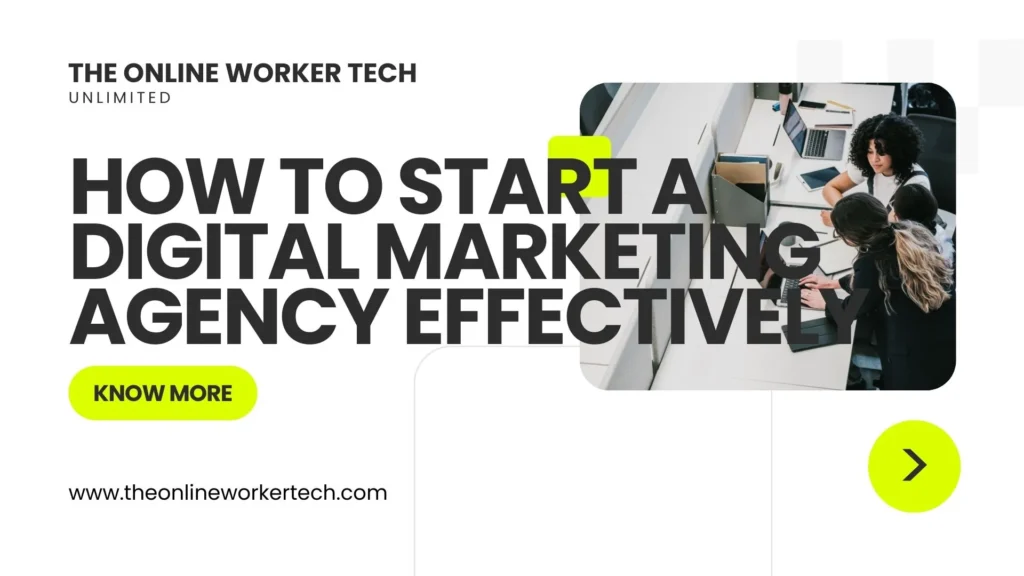Starting a digital marketing agency can be a rewarding venture if you approach it with a clear strategy. Here’s a step-by-step guide to effectively launch a digital marketing agency, this guide help you how to start a digital marketing agency effectively
Step 1: Define Your Niche
Identify the specific industry or service you want to focus on. For example, you could specialize in:
- Social media marketing for e-commerce
- SEO for small businesses
- Content marketing for technology startups
Why this matters: Specializing allows you to become an expert in one area, which helps you attract a targeted audience and stand out from generalist agencies.
Step 2: Conduct Market Research
Research your competitors and potential clients. Analyze:
- Who your competitors are
- What services they offer
- Pricing models
- Pain points of businesses in your niche
Why this matters: Market research helps you identify opportunities to differentiate your agency and offer better services.
Step 3: Develop a Business Plan
Create a business plan outlining:
- Your agency’s mission and goals
- Services you’ll offer (e.g., SEO, content creation, PPC, email marketing)
- Pricing structure (hourly, retainer-based, or project-based)
- Financial projections
- Marketing strategies for attracting clients
Why this matters: A solid business plan will guide your agency’s growth and help secure funding if needed.
Step 4: Build Your Brand
Develop a professional brand identity, which includes:
- Agency name and logo
- Website
- Brand colors, fonts, and style guidelines
Ensure your website highlights your services, case studies, and a clear call to action. Potential clients will judge your digital marketing skills based on your own digital presence.
Why this matters: A strong brand helps build trust and credibility with clients.
Step 5: Set Up Essential Tools
Invest in the right digital marketing tools to streamline your work. Some common tools include:
- SEO: SEMrush, Ahrefs, or Moz
- Email marketing: Mailchimp or HubSpot
- Social media management: Buffer or Hootsuite
- Analytics: Google Analytics, Hotjar
- CRM: HubSpot, Salesforce
Why this matters: Using the right tools helps you manage client projects more effectively and deliver high-quality services.
Step 6: Create a Portfolio
If you don’t have any clients yet, consider:
- Offering free or discounted services to friends, family, or small businesses
- Creating case studies with these early projects
- Showcasing personal projects where you’ve used digital marketing strategies
Why this matters: A portfolio demonstrates your expertise and builds trust with potential clients.
Step 7: Establish Legal and Financial Foundations
- Register your business: Choose a business structure (LLC, sole proprietorship, etc.) and register it according to your country’s laws.
- Open a business bank account: Keep your personal and business finances separate.
- Get insurance: Protect your agency with liability insurance.
Why this matters: Legal and financial organization ensures your business is protected and can operate smoothly.
Step 8: Develop a Lead Generation Strategy
To get your first clients:
- Leverage your network: Ask for referrals or introduce your services to contacts.
- Use inbound marketing: Create valuable content (e.g., blog posts, social media posts) to attract prospects to your website.
- Use outbound marketing: Reach out directly to businesses via cold emails or LinkedIn.
- Attend networking events or webinars: Build relationships with potential clients.
Why this matters: A lead generation strategy is essential for building your client base.
Step 9: Focus on Client Relationships
- Communicate regularly with clients to understand their needs and goals.
- Set clear expectations and timelines for deliverables.
- Provide detailed reports showing the results of your marketing efforts.
Why this matters: Satisfied clients are more likely to give referrals and remain loyal, helping your agency grow.
Step 10: Scale Your Agency
Once you have a few clients, start scaling by:
- Hiring employees or freelancers to handle increased workloads.
- Expanding your service offerings.
- Automating repetitive tasks using tools and software.
Why this matters: Scaling helps you grow revenue while maintaining service quality.
Bonus Tips:
- Stay Updated: Digital marketing trends change frequently. Stay informed by attending webinars, taking courses, and reading industry blogs.
- Network with other professionals: Join digital marketing communities and forums to build connections and learn from others.
By following these steps, you’ll build a strong foundation for your digital marketing agency and set yourself up for long-term success.
